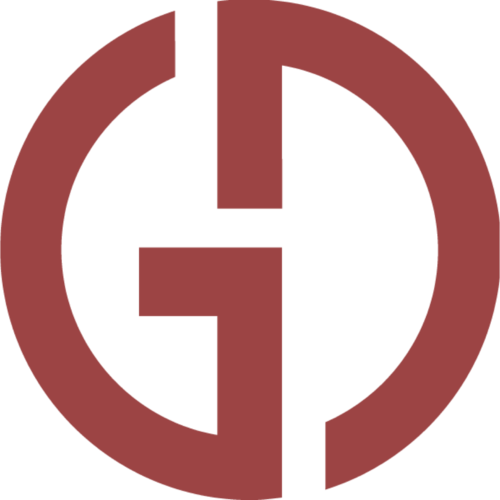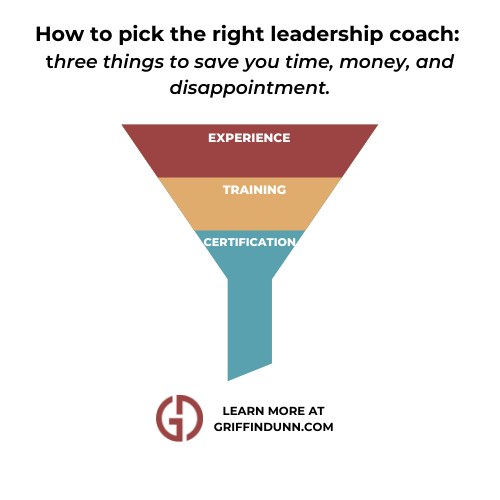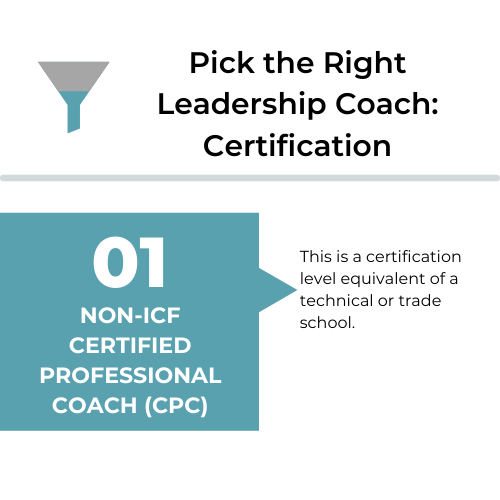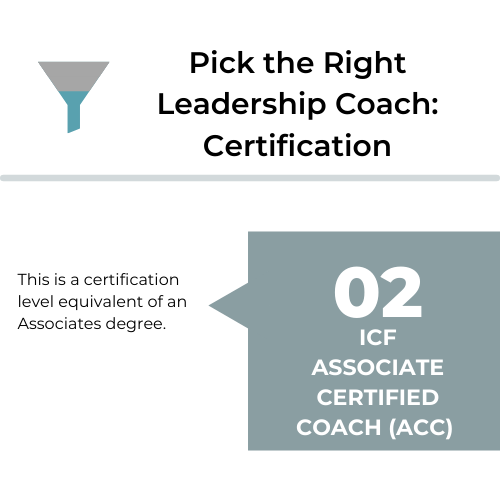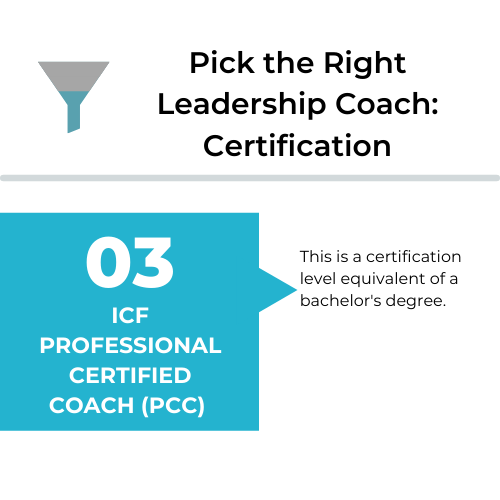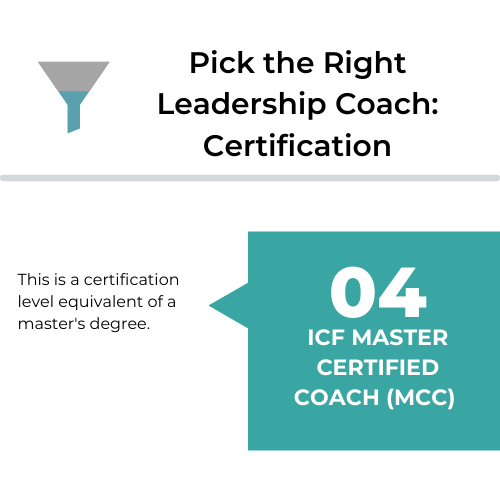How to pick the right leadership coach (act III)
Is a coach just a coach? How do I choose the right one for me?
This is the third of a three-part series of articles that will help clarify and simplify your decision, and to make sure you don’t make a bad choice.
In our previous articles, we took a deep look at how to evaluate the experience level and training of a potential coach. This article will go deeper into how to assess a potential coach’s certification.
As a quick reminder: There are three major criteria to evaluate and weigh according to your unique situation:
Experience, Training, and Certification.
The three most important criteria for picking a leadership coach: experience, training, and certification
Let’s dive deeper into the third criteria: Certification.
Choose a coach that is committed to the profession and continued excellence in the field.
As you consider your potential coach’s certification, you might be asking yourself: Is a certified coach really necessary? How will you know that the certification your coach holds is valid and meets your needs? What are the plusses and minuses of engaging a certified coach versus an uncertified coach?
There are so many certifications out there and they are changing rapidly and regularly, so it would be impossible for me to address them all. Instead, let's look at what certification is, what it entails so that you can more clearly understand whether those letters after their name actually mean something to you.
First, let's answer the overarching question of the difference between a certified coach versus an uncertified coach. A certified coach has made a commitment to coaching as a profession. They have been to school specifically for the purpose of learning the foundation, tools, and techniques to achieve this goal.
Organizations like the International Coaching Federation (ICF), the International Association of Coaching (IAC), and the International Authority for Professional Coaching and Mentoring (IAPC&M) are working to raise the bar and set the standards for this burgeoning industry. They provide credentialing of courseware and processes for the courses taught to achieve certification. While they each have unique aspects with regard to their philosophy of coaching, their accredited schools are reviewed and assessed as to the quality of their instruction against an objective set of standards.
The courseware generally has a combination of “book learning” and practicum or apprenticeship that makes them unique. Some require not only the courseware to be completed but also a dictated amount of hours for the student to be awarded a certification of professional achievement.
In general, the ICF is considered the most rigorous and the “gold standard” for coach certification. This training and certification are required by major corporations and institutions with coaching programs for leadership development.
Each of the institutions cited above has gradients of achievement and varying levels of rigor that align with their philosophy about training. ICF is the most widely recognized global accrediting body as of this writing, one could call it the “gold standard”. For the purposes of this article (and for the sake of readability!) I am going to focus on ICF’s curriculae and accreditation levels.
For simplicity's sake, I am going to deploy a comparison that we are all at least somewhat familiar with, the American university system of degrees (technical/trade school, associates, bachelors, masters degrees). This is an imperfect analogy so please bear that in mind.
Third Criteria: Certification.
There are four Certification Levels that are critical for you to consider.
Training Level 1: Non-ICF Certified Professional Coach (CPC) or other designation
American university degree analogy: Technical/Trade School Certification
The delineating factor for the school-designated distinction is accreditation. Schools accredited by the ICF or other accrediting bodies generally follow the same curriculum for those who do or do not, pursue the additional rigor of receiving recognized board certification. Those that aren’t accredited have the freedom to offer courseware of their choosing that may or may not include actual coaching experiences.
The requirements for attendance and graduation from these programs vary dramatically from two-day seminars over a weekend to a rigorous accredited progression.
Certification Level 2: Associate Certified Coach (ACC)
American university degree analogy: Associates Degree
The ACC is the first certification level from the ICF. There are three paths to achieve this certification but in general, it requires:
A minimum of 60 hours of training at an accredited ICF training school.
10 hours of mentored coaching with an ICF certified coach
A minimum of 100 hours of post-training coaching with Clients
Passing the Coaching Knowledge Assessment examination (a 3 hour proctored examination covering all aspects of coaching)
Note: some coaches achieve the ACC in pursuit of their PCC credentials.
Certification Level 3: Professional Certified Coach (PCC)
American university degree analogy: Bachelors Degree
The PCC is the second certification level from the ICF. There are three paths to achieve this certification but in general, it requires:
A minimum of 125 hours of training at an accredited ICF training school. The additional classwork explores the “how and why” beyond the “what” of coaching. The training explores subjects such as Neurobiology and Somatic techniques, amongst others, to deepen the coach’s knowledge and effectiveness with Clients.
10 hours of mentored coaching with an ICF certified coach at the PCC certification or greater
A minimum of 500 hours of post-training coaching with Clients
2 recorded, transcripted coaching sessions evaluated and annotated by an ICF certified coach at the PCC certification level or greater
Passing the Coaching Knowledge Assessment examination (a 3 hour proctored examination covering all aspects of coaching).
Note: many coaches achieve the ACC in pursuit of their PCC credentials.
Certification Level 4: Master Certified Coach (MCC)
American university degree analogy: Masters Degree
The MCC is the final certification level from the ICF. To achieve this certification, it requires:
PCC certification
A minimum of 200 hours of training at an accredited ICF training school. The additional classwork goes much deeper into the “how and why” beyond the “what” of coaching. The training goes in-depth into subjects such as Neurobiology and Somatic techniques, amongst others, to deepen the coach’s knowledge and effectiveness with Clients.
10 hours of mentored coaching with an ICF certified coach at the MCC certification or greater
A minimum of 2500 hours of post-training coaching with Clients
2 recorded, transcripted coaching sessions are evaluated and annotated by an ICF-certified coach at the MCC certification level.
Passing the Coaching Knowledge Assessment examination (a 3 hour proctored examination covering all aspects of coaching).
Other Certifications: Specialty or non-ICF Board Certified Coach (BCC)
American university degree analogy: Continuing Educational Certifications
This certification is issued by the Center for Credentialing and Education (CCE).
Usually, the BCC designation is issued to those already practicing in a related field such as a state-licensed counselor, master's degree psychologist, or medical doctor. To achieve this certification, it requires:
30-120 hours of approved continuing education credits
A minimum of 30 hours of coaching experience
Passing the Board Certified Coach (BCC) exam
Whew! That was a lot to drink in. Certification is the criteria that tell you that your coach is in it for the long term. It’s expensive, time-consuming, and rigorous to achieve an ICF designation.
In addition, there are ongoing Continuing Education Units required to maintain the certification once it's achieved. So your coach is in it for the long term. Any level of the above certifications can provide you with the professional coach you need.
Download the Certification Criteria Checklist
This is the last in a series of articles to evaluate your future leadership coach. We’ve looked at how to use the three major criteria to evaluate and weigh according to your unique situation:
Experience, Training, and Certification.
Dan Bartholomew, ICF-PCC, WPCC, is an Executive and Leadership Coach who helps teams and leaders navigate their careers 🛶. With decades of experience running, building, and scaling businesses, Dan is centered on enabling individuals and teams to achieve and sustain breakthrough performance -- personally and organizationally.
As Eric Schmidt, former CEO and current strategic advisor to Google said “everyone needs a coach.” Let’s work together to get you one!
